PR/Announcements
News and Announcements
SCAT DHHS and SCUSD host Spring into Health 2024

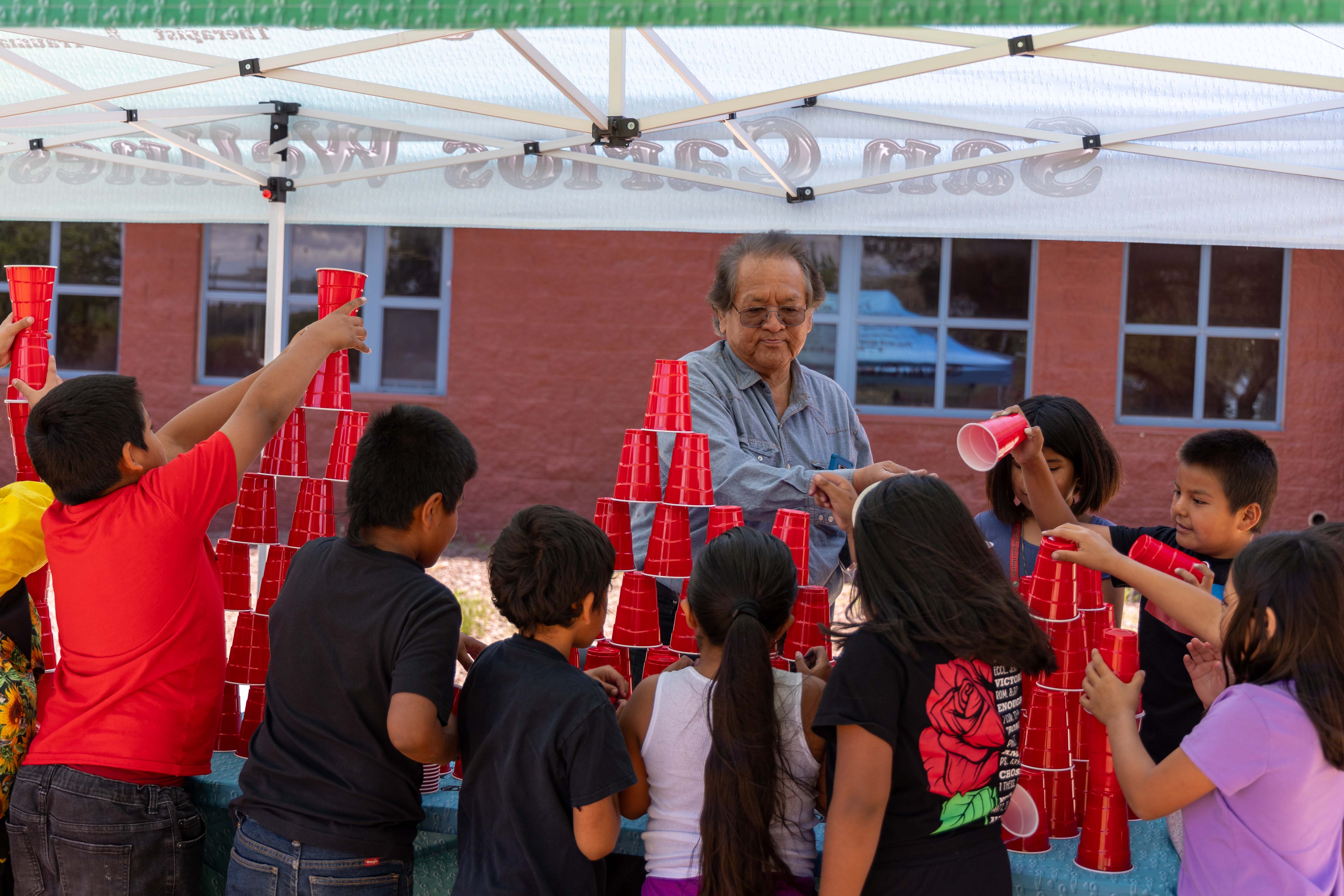
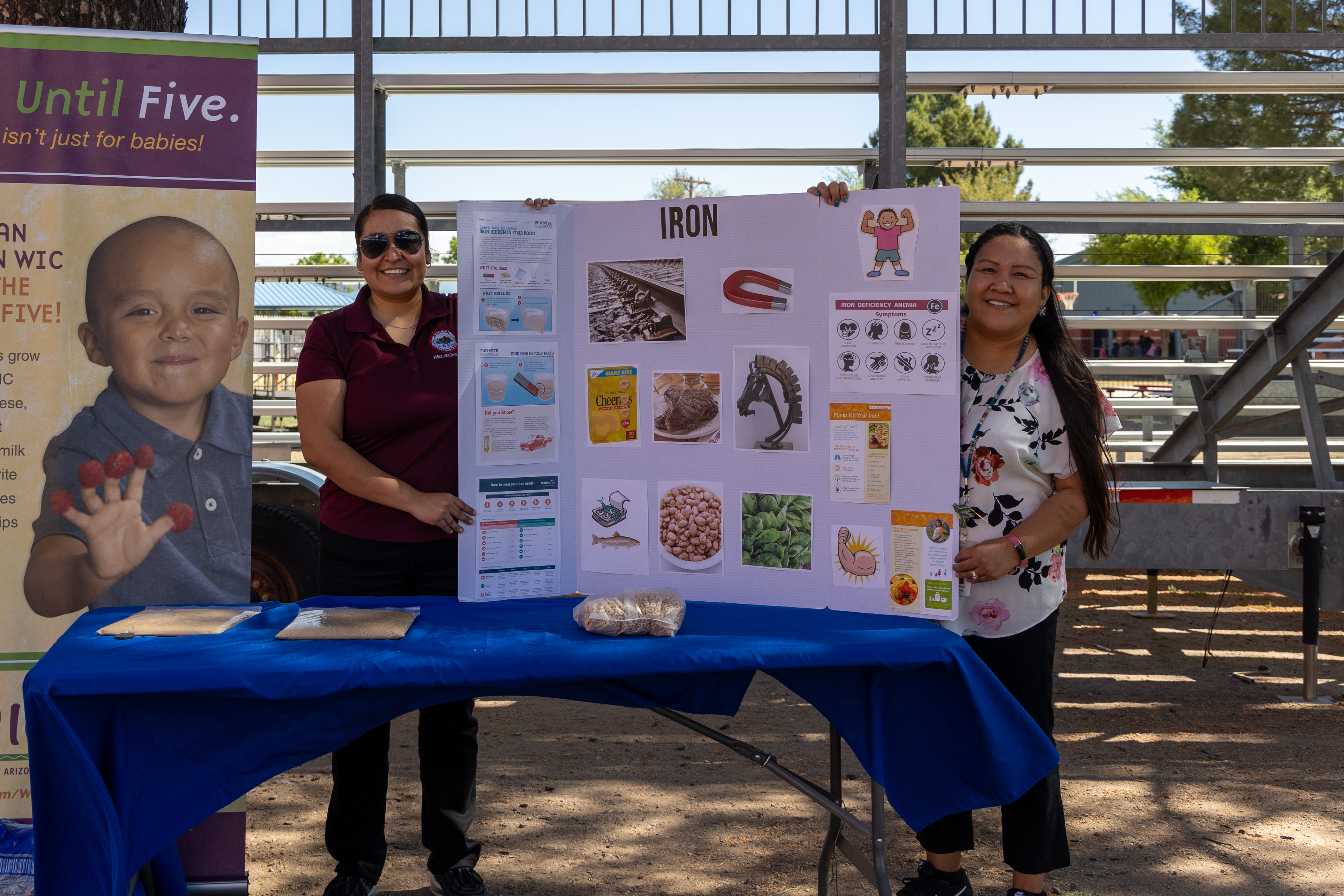
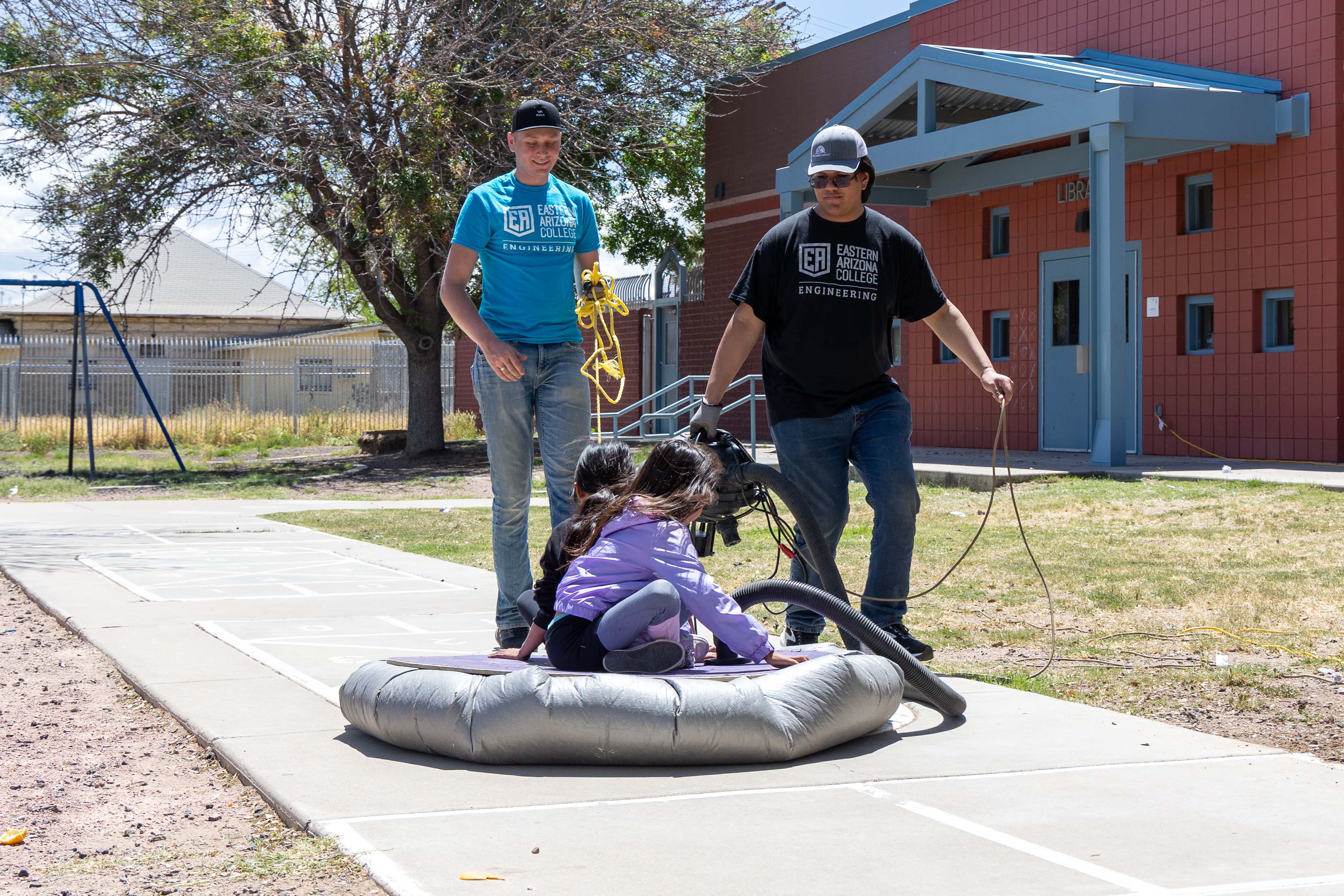
By: Aaron Tohtsoni
DHHS Communications Administrative Officer
SAN CARLOS, Ariz.—The San Carlos Apache Tribe’s Department of Health & Human Services (DHHS) partnered with the San Carlos Unified School District #20 for a third straight year to jointly-host Spring into Health STEM/Health Fair for students at Rice Elementary and Rice Intermediate.
“DHHS is always excited to partner with the community and local schools for events,” said DHHS Executive Director David Reede. “Not only is this event fun for the kids with the hands-on demonstrations but it also exposes them to the different areas of STEM and hopefully, opens their eyes to future possibilities.”
The annual event is geared towards kindergarten through fifth grade students, exposing them to science, technology, engineering, mathematics, and health topics. DHHS programs that participated were Public Health Nursing (PHN), Community Health Representatives (CHR), Arizona Long-Term Care Services (ALTCS), the Wellness Center Prevention Team, EMS/Fire and support from Older Adult Center staff.
In addition to hosting the event, the school district had participation from the San Carlos High School Robotics Team and demonstrations from the school science club.
Other participants included the Eastern Arizona College STEM Club, U.S. Forest Services, USDA Natural Resources Conservation Service, Freeport-McMoran, the San Carlos Education Department, the San Carlos EPA Department and Molina Healthcare.
The Centers for Disease Control and Prevention (CDC) has stated that exposure to STEM is critical to the future of public health. According to their website, “To have a workforce prepared to address today’s issues, we need to spark the interest of middle and high school students in STEM‐based careers—especially public health. As the current generation of public health workers retire, it is critical to prepare the next generation of skilled professionals to confront ongoing and emerging public health threats. Students who receive effective STEM education earlier are more likely to pursue STEM Careers.”
Students were shown science demonstrations, taught certain health topics and how it relates to everyday life and were also shown the fun sides of science, like riding on a Hoverboard.
“There was incredible participation and enthusiasm from the students, who learned from hands-on experiments to insightful presentations,” said Aaron Tohtsoni, DHHS Communications Administrative Officer, who helped coordinate the event. “It was a day filled with learning and inspiration for the future innovators and health advocates of San Carlos.”
Animal Control Program goes Door-to-Door for RMSF Prevention
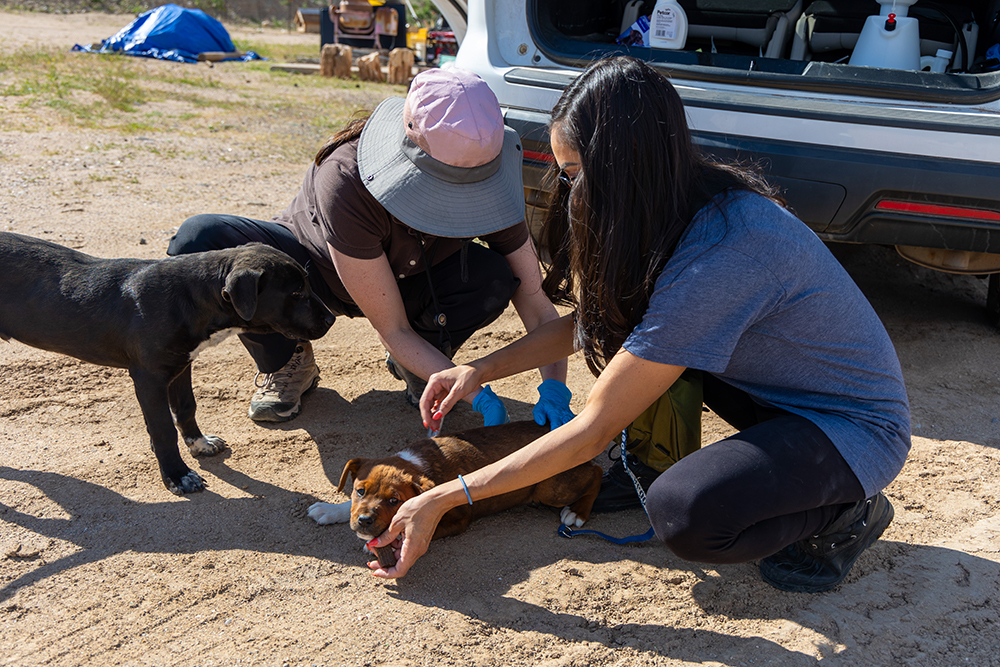
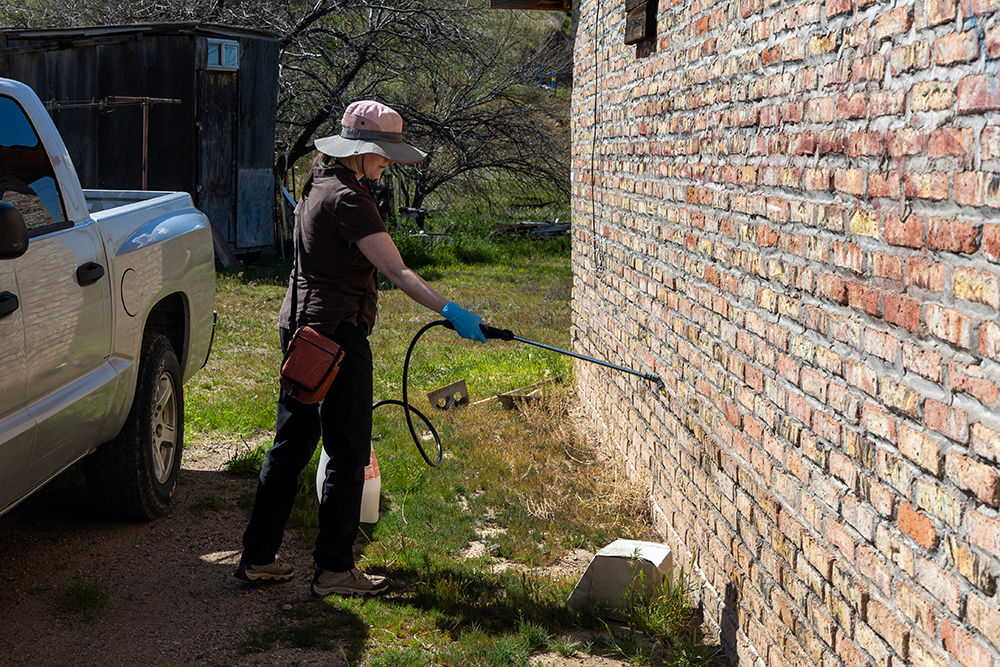
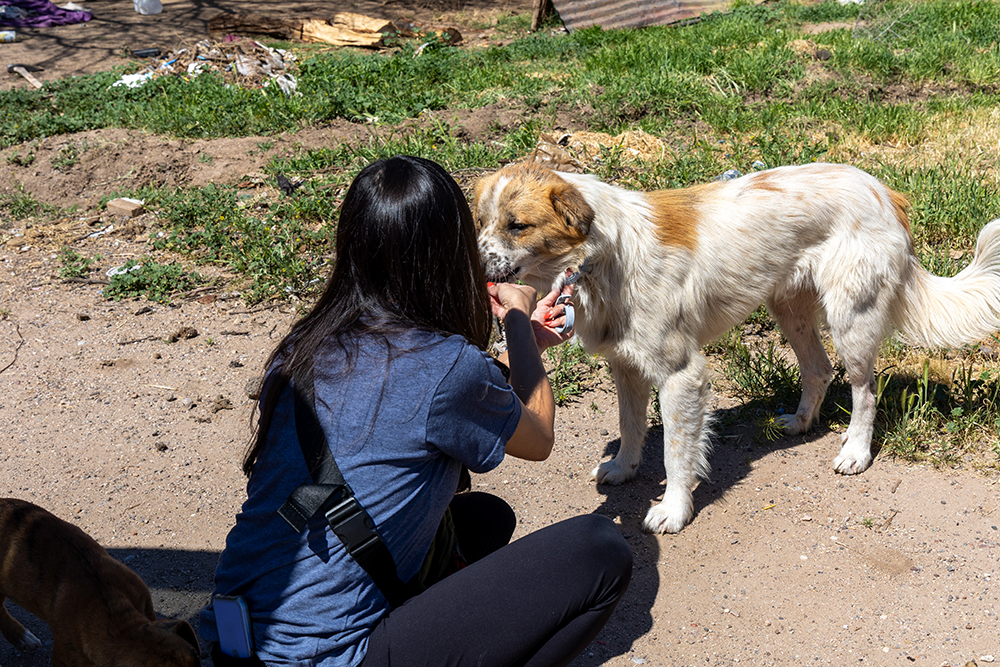
By: Aaron Tohtsoni
SCAT DHHS Communications Administrative Officer
SAN CARLOS, Ariz. — The San Carlos Apache Tribe’s Department of Health & Human Services’ (DHHS) Animal Control Program conducted a weeklong Rocky Mountain Spotted Fever (RMSF) prevention campaign throughout the San Carlos and Bylas communities.
Teams were deployed into each district spraying homes with pesticides and applying tick collars or tick oil/drops onto dogs while educating the community on RMSF and ways to help prevent ticks.
The teams were made up of volunteers from various DHHS programs, including Animal Control, Public Health Nursing (PHN), Community Health Representatives (CHR), DHHS Administration as well as individuals from the Center for Disease Control and Prevention (CDC), Indian Health Services (IHS), Arizona Department of Health and Human Services (AZDHS), Arizona State University, the University of Arizona and the White Mountain Apache Tribe’s RMSF team.
In total, 321 homes were treated with a pesticide spray while 632 dogs were given fresh tick collars that last up to eight months. Not all dogs are mature enough to handle the tick collar medicine, so 252 were treated with tick drops or tick spray.
In addition to dog collaring, Rural Animal Veterinary Services (RAVS) also had a veterinary team ready to assess and treat sick or injured animals.
SCAT DHHS along with the Animal Control Program are committed to helping keep the community safe from the dangers of Rocky Mountain Spotted Fever and these Door-to-Door events have shown success.
“The RMSF Door-to-Door prevention campaigns take a lot of hard work and man hours, we are extremely thankful for the volunteers who come and help in this event,” said DHHS Executive Director David Reede. “It’s a great undertaking but the fact that we treated so many houses and dogs in the community shows our commitment to limiting the risk of RMSF in the community.”
A week prior to the Door-to-Door campaign, the CDC conducted a KAB survey in certain communities on the San Carlos Apache reservation. These surveys help guide communication outreach and help identify areas for improved knowledge and behavior efforts.
Wellness Center brings awareness to child abuse and sexual assault with prevention parade
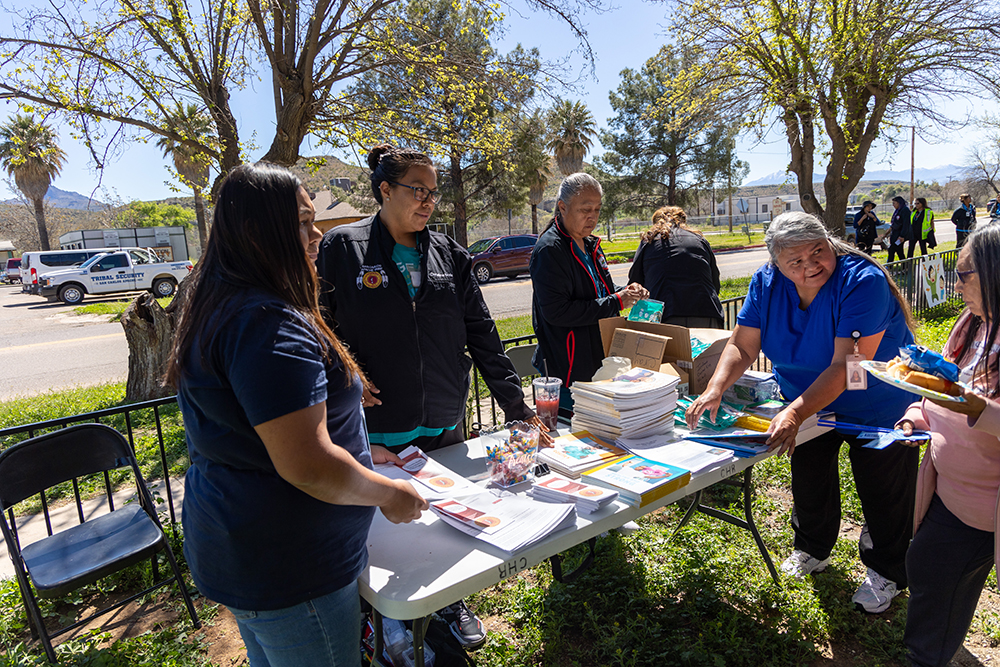
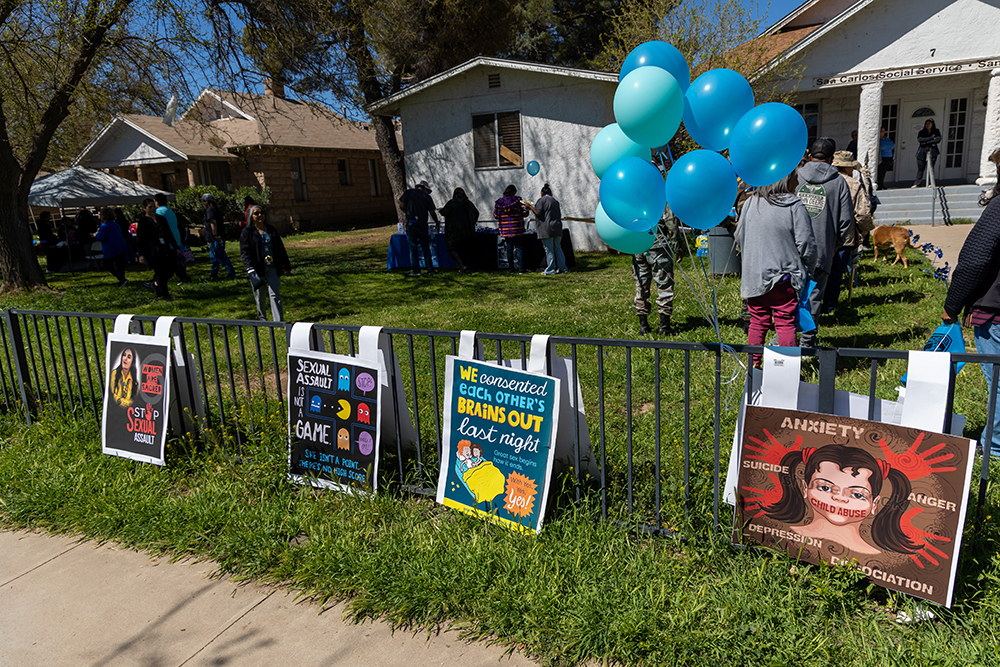
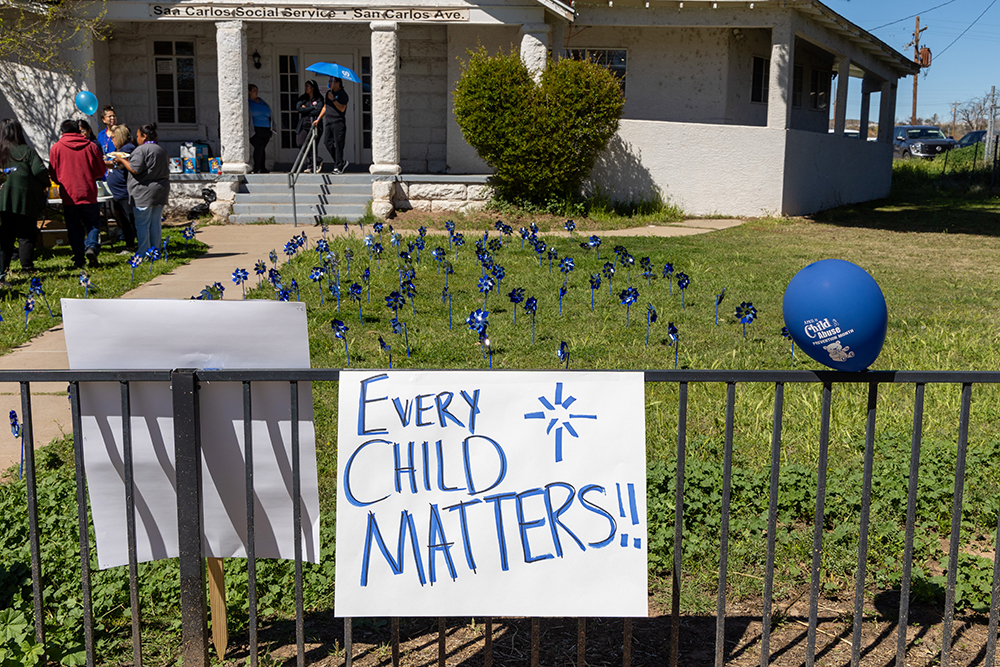
By: Aaron J. Tohtsoni
SCAT DHHS Communications Administrative Officer
SAN CARLOS, Ariz. — The San Carlos Wellness Center Prevention Program held an “End Child Abuse and Sexual Assault” Awareness parade in downtown San Carlos on April 3.
The parade was held in conjunction with Tribal Social Services and San Carlos Apache Healthcare.
“The Wellness Center's aim of the Child Abuse and Sexual Assault event was to bring awareness to our Tribal members,” said Wellness Center Program Director Shalenia Chee. “Sadly, there are issues of child abuse and neglect and the event served as a reminder that communities that work together can build a strong support system for those who are affected through hope and healing.”
Participants in the parade ranged from the San Carlos Veterans Association to various Tribal Royalty including Miss San Carlos Isabella Newman, Miss Mt. Turnbull Kirah Moses, Miss Indian Fort Thomas Makayla Chapman, Missy Mt. Turnbull Khloe Newman, and San Carlos Baby Girl of the Year Henlie Crowe.
Also in the parade were San Carlos Apache Healthcare’s Sexual Assault Resource Team, Public Health Nursing (PHN), Maternal Child Health (MCH), Women, Infant and Children (WIC), Seven Mile Wash Headstart, Wellness Center’s PSR group, Forestry Fire Use Program and a local motorcycle group.
Following the parade, information booths were set up on the San Carlos Wellness Center lawn and Tribal Social Services provided lunch. Booth participants included the Wellness Center, SCAHC Sexual Assault Resource Team, Grand Canyon University, SWISC- Missing and Murdered Indigenous Relatives, Community Health Representatives (CHR), Social Services, the San Carlos Police Department, and the San Carlos Detention Center.
In tune with Chee’s sentiments, community members saw the vast network of different programs who can help assist with the tough issues.
“It’s always tough to talk about issues that the community might find uncomfortable,” said DHHS Executive Director David Reede. “However, it’s important to show that resources are readily available and having events like this are important to the community, especially to show that you’re not alone in dark times. I am thankful for the Wellness Center’s efforts and the event they held.”
PHN-Health Education hosts Community Cancer Awareness Event

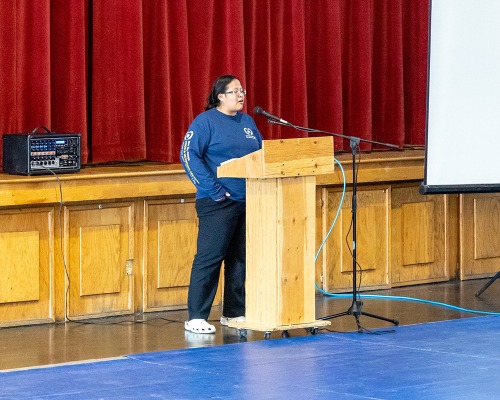
By: Aaron J. Tohtsoni
DHHS Communications Administrative Officer
The San Carlos Department of Health & Human Services’ (DHHS) Public Health Nursing-Health Education program recently held a Community Cancer Awareness Event at Burdette Hall.
According to event host Joyce Tovar, the main purpose of the event was to support and honor the local cancer patients, survivors and those who lost a loved one to cancer. The event allowed individuals to share the different perspectives and journeys associated with cancer.
Tovar is a Health Educator under PHN. There were 114 participants that visited the event.
The event started when Miss San Carlos Isabella Newman gave a welcome address and shared a song with those in attendance.
Among those who shared their stories was Chenoa Dude and her mother. Dude was only nine years old when she was diagnosed with a brain tumor/cancer medulloblastoma. She was young at the time and her mother shared how the family managed to get her the necessary treatment to fight the cancer.
At 28, Dude again had a bout with cancer, this time renal cell carcinoma/kidney cancer. Again, she battled the cancer head on and shared her story in becoming a strong survivor.
San Carlos Forestry Department’s Seth Pilsk, who works closely with tribal elders, discussed the environmental impact from the 1960s on the community. Marlowe Cassadore from the Apache Cultural Center shared the N’nee perspective on cancer.
DHHS epidemiologist Dr. Yvonne Lees discussed the different cancer treatments.
Others that shared resources at the event were Brian Hummell, the government relations director of the American Cancer Society – Phoneix, Candice Lewis from the federal cancer compensation program in Flagstaff. Also speaking was Dr. Michele Caron and Stephanie Zaye from the San Carlos IHS healthcare.
Also sharing cancer resources were Carol Goldtooth, Northern Arizona University’s Native American Cancer Prevention, and Roseann Garcia-Castaneda and Chris Holguin of THEMA Hospice in Globe.
Community Health Represenatives (CHR) and Public Health Nursing (PHN) assisted as well.
Miss Shi Woye’ Saan, Geraldine Kitcheyan, ended the event with a prayer.
The San Carlos Apache Tribal Council donated funds for the purchase of giftcards that were given to current cancer patients to help offset the costs of traveling to and from their treatment appointments. In addition to the monetary gifts, the council members donated different raffle prizes.
Tovar reiterated that the Cancer Awareness event was remarkably successful due to all of the participants and community partners that shared resources.
For more information on the gift certificates, please contact Public Health Nursing at (928) 475-1540.
SCAT DHHS’ Animal Control Program educates youth on RMSF prevention
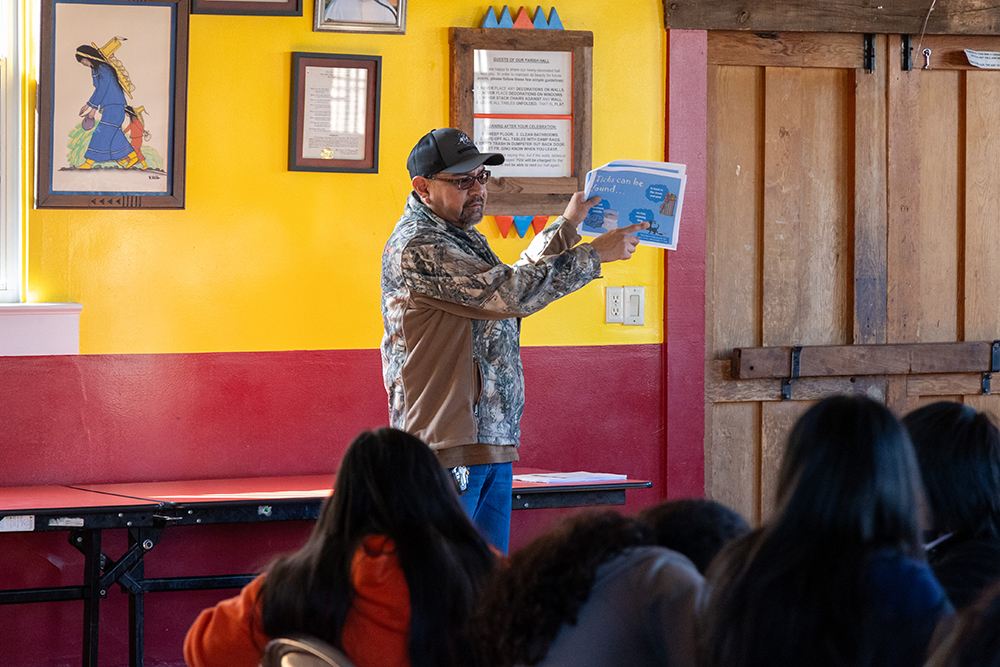
By: Aaron Tohtsoni
DHHS Communications Administrative Officer
SAN CARLOS, Ariz.— The San Carlos Apache Tribe’s Department of Health and Human Services (DHHS) Animal Control Program recently spent time with students from Rice Intermediate School and St. Charles Catholic School.
Animal Control Program Manager Harty Bendle presented to students in third grade, fourth grade, fifth grade and sixth grade between the two schools. The topic of his presentation focused on Rocky Mountain Spotted Fever (RMSF).
The Animal Control Program is working with the Center for Disease Control and Prevention (CDC) on a multi-year grant that focuses on RMSF prevention.
The partnership with CDC has been ongoing for the past 15 years,” said DHHS Executive Director David Reede. “This has allowed for addressing immediate concerns on RMSF within our community. We have now moved to educating the youth for positive growth in the future. The current dialogue on immediate issues never ends; however, change will not occur without prevention and awareness of our community.”
SCAT DHHS and Animal Control focused on school-aged education opportunities because children spend a lot of time outside, which exposes them to ticks from free-roaming dogs.
The education focused on identifying a tick, where ticks can be found, lifecycle and behaviors. In addition, prevention measures were the key highlight for the students. They were taught the importance of treating pets with a tick preventative. They also learned that ticks can be found on a variety of animals, especially pet rabbits.
The children were also taught the importance of performing tick checks after spending time outside, especially if there are free-roaming dogs in the area.
“The classroom presentations are vital for the community,” said Executive Director Reede. “With growth and changes needed in the future, our focus is on the youth. CDC has been a partner for years; however, any immediate needs will need to come from ourselves.”
Animal Control will continue educating the children of the San Carlos and Bylas communities, with future outreach scheduled for the remaining schools on the reservation.
The Animal Control Program can do a yard evaluation, pesticide spraying and provide tick preventatives like collars to the community, free of charge. These services can be requested by contacting the Animal Control office at (928) 475-2688 or Bendle at (928) 961-6185.

